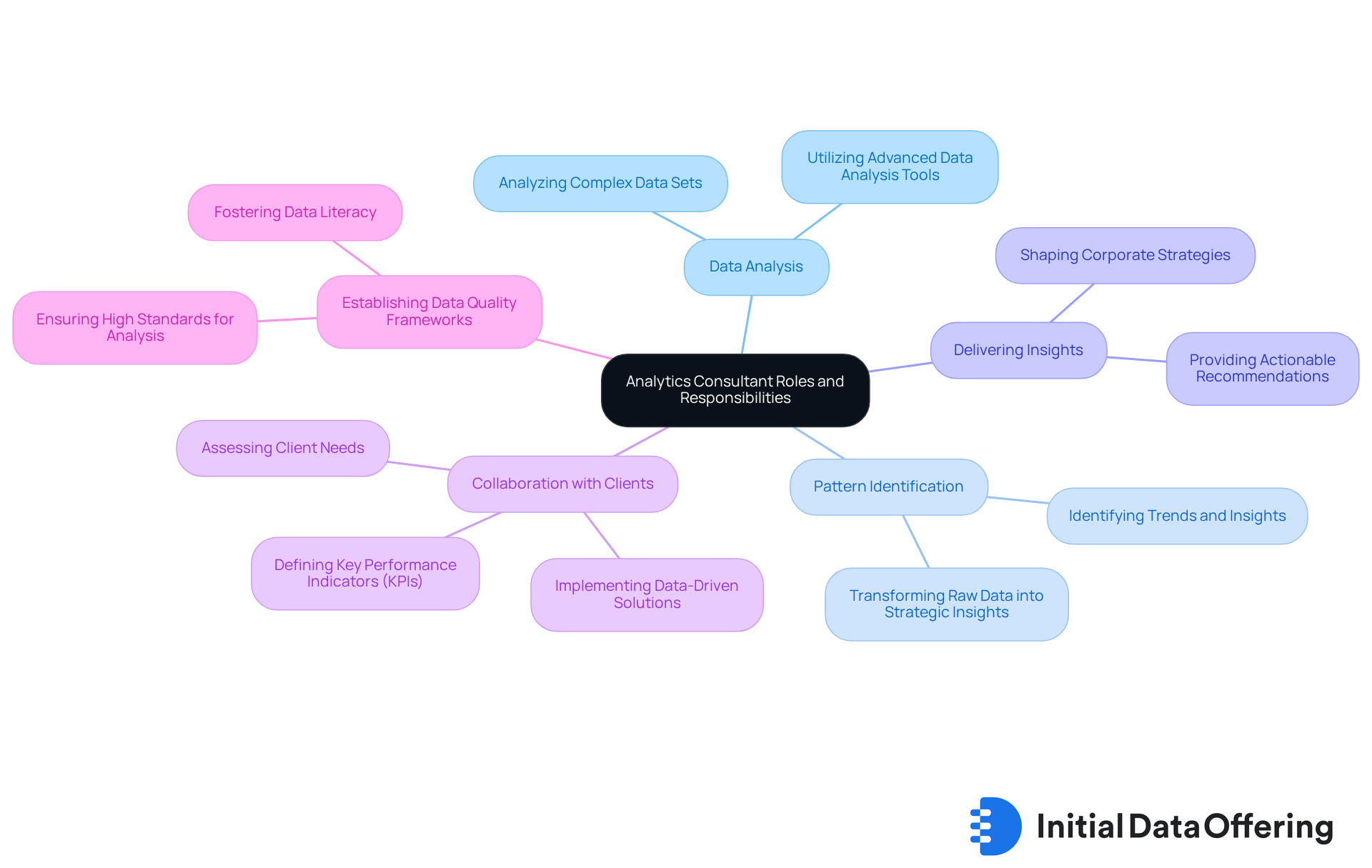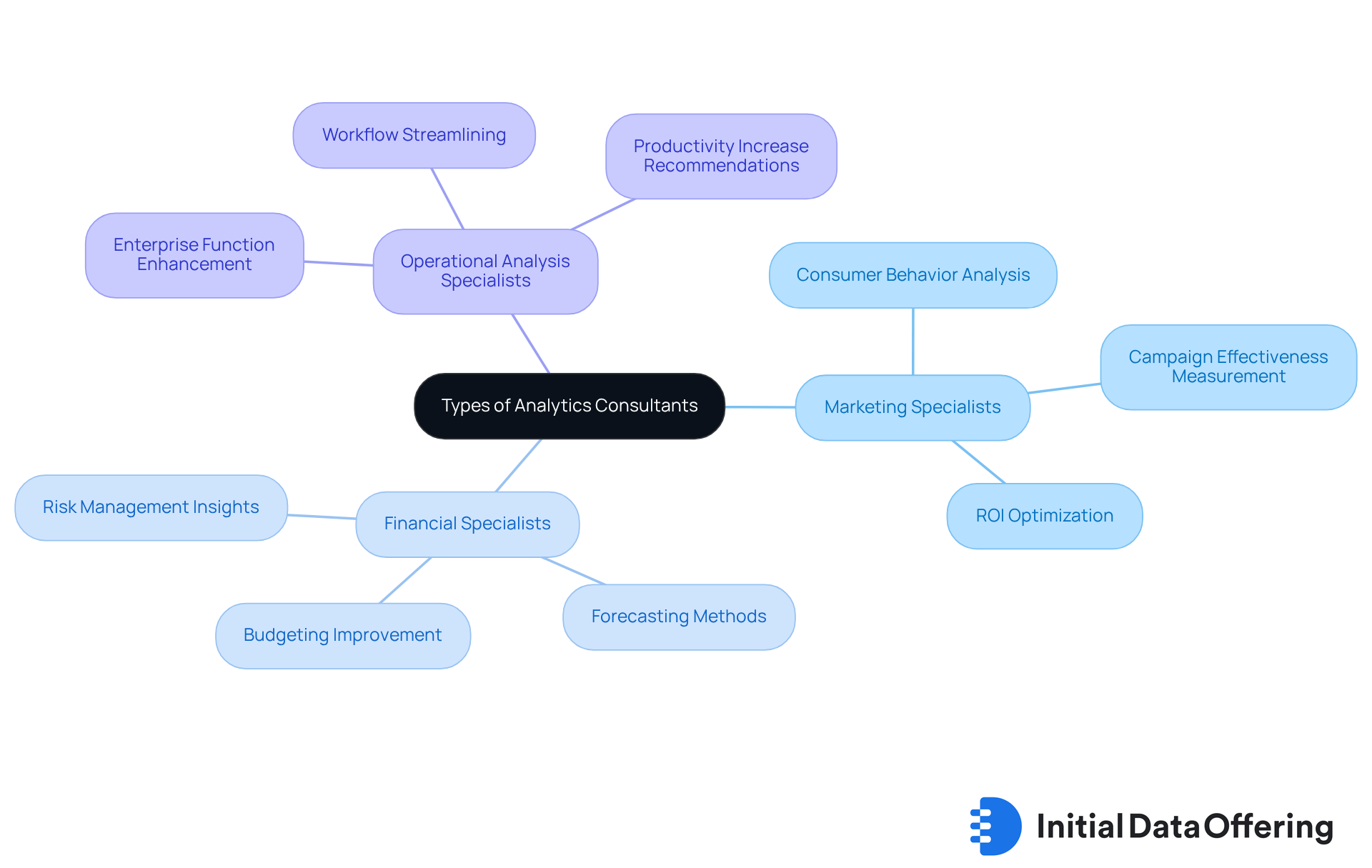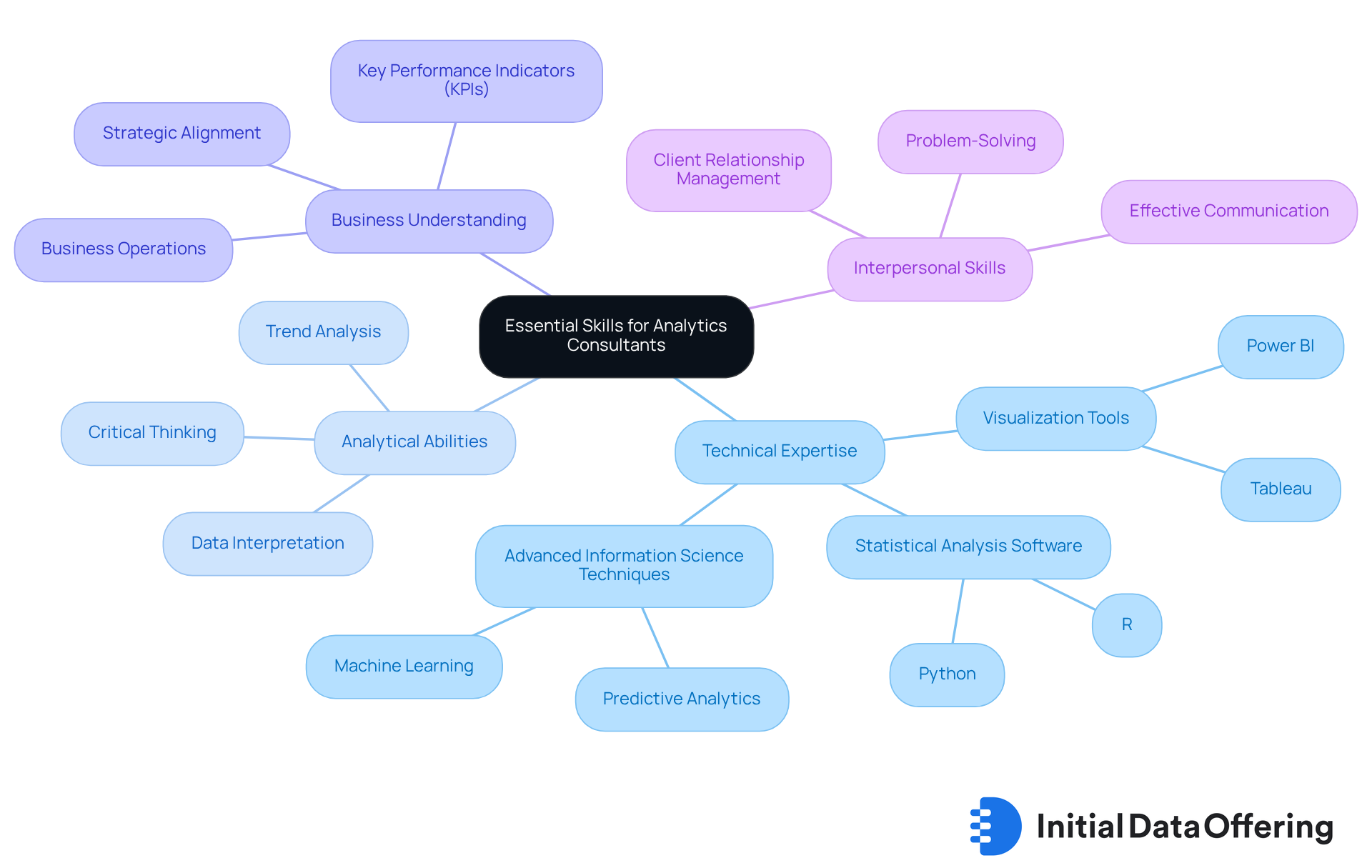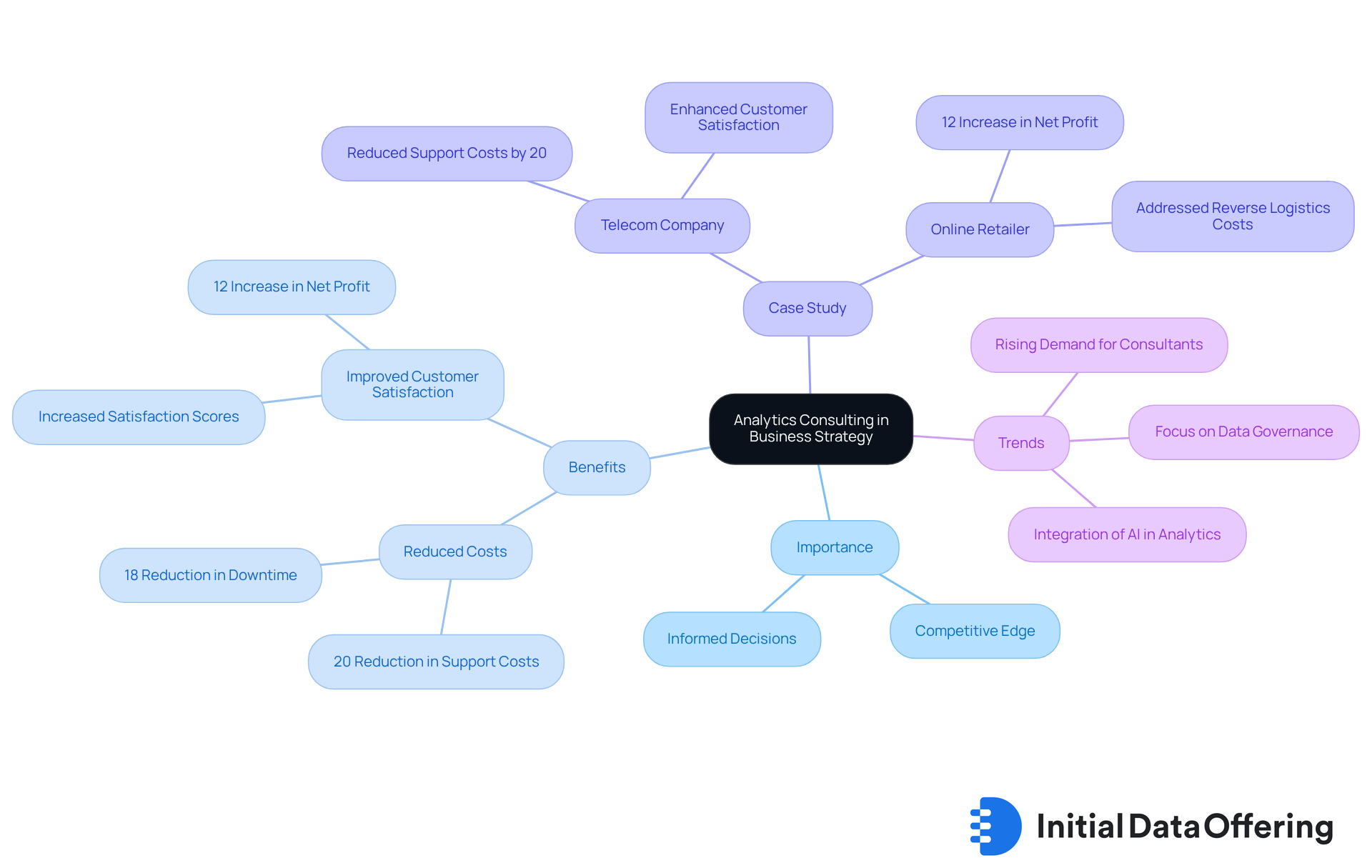What is an Analytics Consultant? Roles, Skills, and Importance

What is an Analytics Consultant? Roles, Skills, and Importance
Overview
An analytics consultant is a specialized expert who analyzes complex data sets. They provide actionable insights that inform corporate strategies and enhance decision-making processes.
Why are analytics consultants important? They help organizations leverage data effectively. This capability allows businesses to improve operations, drive growth, and maintain a competitive edge in an increasingly data-driven landscape. By utilizing their expertise, companies can make informed decisions that lead to better outcomes.
The advantages of hiring an analytics consultant are clear. They not only interpret data but also translate it into strategies that align with business goals. This means organizations can respond swiftly to market changes and customer needs, ultimately leading to increased efficiency and profitability.
In conclusion, the role of analytics consultants is vital in today’s business environment. Their insights empower organizations to harness the full potential of their data, ensuring they stay ahead of the competition. How can your organization benefit from such expertise? Consider the possibilities that data-driven decision-making can unlock.
Introduction
In an era where data drives decisions, organizations are increasingly turning to analytics consultants to harness the full potential of their information. These specialized experts not only analyze complex data sets but also translate findings into actionable insights that shape business strategies. The features of analytics consulting include:
- In-depth data analysis
- Strategic insight generation
The advantages are clear: organizations can make informed decisions based on solid evidence, leading to improved outcomes. Ultimately, the benefit is a competitive edge in a data-driven marketplace.
However, the question remains: how can companies effectively leverage the diverse skill sets of analytics consultants? By navigating the intricate landscape of data-driven decision-making, businesses can unlock new opportunities for growth and innovation. Consider how these consultants can help:
- Identify trends
- Optimize operations
- Enhance customer experiences
What strategies can your organization implement to fully utilize these insights?
Engaging with analytics consultants not only provides access to expertise but also fosters a culture of data-driven thinking within the organization. As companies embrace this approach, they position themselves to thrive in an increasingly competitive environment.
Define Analytics Consultant: Roles and Responsibilities
An analytics consultant is a specialized expert dedicated to helping organizations harness the power of information for informed decision-making. As an analytics consultant, their primary responsibilities include:
- Analyzing complex data sets
- Identifying patterns
- Delivering actionable insights that shape corporate strategies
The analytics consultant works closely with clients to assess specific needs, define key performance indicators (KPIs), and develop tailored, data-driven solutions. This role often requires collaboration with cross-functional teams, as an analytics consultant, to implement advanced data analysis tools and methodologies, ultimately enhancing overall decision-making processes.
For instance, data advisors have been instrumental in transforming raw data into strategic insights, enabling organizations to improve operations and increase customer engagement. A notable example involves a manufacturing company facing challenges with seasonal hiring. By leveraging data analysis, advisors helped optimize their recruitment process, ensuring compliance while effectively addressing workforce needs, which led to improved operational efficiency.
Statistics reveal that 59.5% of corporate leaders are successfully utilizing data-driven decision-making, underscoring the importance of analytics consultants in today’s business landscape. Furthermore, data analytics has been around since the 1950s and 1960s, highlighting its lasting significance in business decision-making. Analytics consultants also play a crucial role in establishing data quality frameworks and best practices, ensuring high standards for accurate analysis and decision-making. Their expertise as an analytics consultant not only aids in navigating complex data environments but also fosters a culture of data literacy within organizations, ultimately resulting in better outcomes and competitive advantages.
How can your organization benefit from the insights provided by data consultants? By understanding the features and advantages of data-driven strategies, you can unlock new opportunities for growth and efficiency.

Explore Types of Analytics Consultants and Their Specializations
Analytics consultants can be classified into various distinct specializations, each addressing unique corporate challenges.
-
Marketing specialists: For instance, delve into consumer behavior and campaign effectiveness. They utilize data to refine marketing strategies and boost return on investment (ROI). By examining metrics such as customer engagement and conversion rates, these specialists empower companies to enhance their marketing efforts efficiently.
-
Financial specialists: Focus on financial data, improving budgeting and forecasting methods. They analyze key financial indicators to provide insights that drive strategic financial planning and risk management. This specialization is vital for organizations striving to maintain financial health and make informed investment decisions.
-
Operational analysis specialists: Work to enhance enterprise functions through data examination, identifying weaknesses and recommending procedural improvements. By leveraging data-driven insights, they assist organizations in streamlining workflows and increasing productivity.
Each category of advisor, including the analytics consultant, contributes a unique skill set tailored to their focus area, fostering a comprehensive approach to data-driven decision-making. As the demand for specialized analytical skills grows, understanding the role of an analytics consultant becomes essential for companies that aim to harness the full potential of their data.
According to the Bureau of Labor Statistics, the employment of information scientists is projected to rise by 36% from 2023 to 2033. This statistic underscores the increasing need for analysis specialists. Furthermore, the national average salary for these professionals stands at $87,137 annually, with Minneapolis offering the highest average at $122,997. This context highlights the significance of these roles in the evolving landscape of information analysis.

Identify Essential Skills and Qualifications for Analytics Consultants
To excel as an analytics consultant, individuals must possess a blend of strong analytical abilities and technical expertise.
- Expertise in visualization tools, such as Tableau and Power BI, is crucial for presenting insights effectively. This proficiency allows professionals to transform complex data into understandable visuals, making it easier for stakeholders to grasp key findings.
- Additionally, knowledge of statistical analysis software, including R and Python, is essential for conducting in-depth analyses. These tools empower analysts to uncover trends and patterns that drive informed decision-making.
A solid understanding of business operations and strategy further enhances a professional's ability to provide actionable insights. By aligning data analysis with organizational goals, an analytics consultant can deliver recommendations that truly impact business outcomes.
- Moreover, mastering advanced information science techniques, such as predictive analytics and machine learning, is increasingly important for delivering deeper insights. These skills enable professionals to anticipate future trends and behaviors, providing a competitive edge in the marketplace.
Interpersonal abilities are equally essential; effective communication, problem-solving, and critical thinking allow consultants to convey intricate results clearly to stakeholders. How can you ensure your findings resonate with your audience? Understanding data privacy regulations and ethical AI use is also becoming essential in the current landscape, as organizations prioritize responsible data practices.
The usual educational route comprises a bachelor's degree in areas such as statistics, mathematics, or data analysis, with numerous professionals seeking advanced degrees to enhance their expertise.
- Internships offer valuable hands-on experience and can assist aspiring professionals in meeting experience requirements. These opportunities not only build skills but also expand professional networks, which are vital in this field.
As the need for data specialists expands—expected to rise by 14% from 2020 to 2030—possessing a solid skill set that merges technical expertise with strong interpersonal skills is more crucial than ever for enhancing intelligence and sustaining a competitive advantage.
- Attractive traits like teamwork and advisory experience further increase a candidate's attractiveness, demonstrating the versatility of the skill set in data analysis across different sectors. How prepared are you to meet this growing demand?

Understand the Importance of Analytics Consulting in Business Strategy
Analytics consulting plays a vital role in modern corporate strategy by enabling organizations to harness the power of information. What if your company could gain a competitive edge simply by understanding data better? By providing insights into market trends, consumer behavior, and operational efficiencies, data consultants empower companies to make informed decisions that drive growth and innovation.
For example, consider a midsize telecom firm that reduced support costs by 20% while simultaneously enhancing customer satisfaction through targeted data analysis. This case illustrates the tangible benefits of consulting services. In today’s competitive landscape, effectively leveraging data can be a game changer, leading to improved profitability and stronger market positioning.
As businesses increasingly acknowledge the importance of data-driven insights, the demand for skilled analytics consultants continues to rise. This trend underscores their crucial role in fostering innovation and strategic growth. Are you ready to explore how analytics can transform your organization?

Conclusion
An analytics consultant plays a crucial role in transforming raw data into actionable insights that drive strategic decision-making within organizations. By leveraging their expertise in data analysis, these professionals enhance operational efficiency and foster a culture of data literacy, which is essential for navigating today’s competitive business landscape.
The article outlines key roles and responsibilities of analytics consultants, emphasizing their involvement in:
- Analyzing complex data sets
- Identifying patterns
- Delivering tailored solutions that align with organizational goals
Various specializations, such as marketing and financial analytics, are explored, showcasing how these consultants tackle unique challenges across different sectors. Moreover, the essential skills and qualifications required for success in this field are highlighted, underscoring the blend of technical expertise and interpersonal abilities necessary to communicate insights effectively.
The significance of analytics consulting cannot be overstated. It empowers organizations to make informed decisions that lead to growth and innovation. As the demand for data-driven strategies continues to rise, embracing the insights provided by analytics consultants presents a unique opportunity for businesses to gain a competitive edge.
How can analytics revolutionize your operations and contribute to long-term success? Organizations are encouraged to consider this question as they explore the transformative potential of analytics.
Frequently Asked Questions
What is the role of an analytics consultant?
An analytics consultant is a specialized expert who helps organizations harness information for informed decision-making. Their primary responsibilities include analyzing complex data sets, identifying patterns, and delivering actionable insights that shape corporate strategies.
How do analytics consultants work with clients?
Analytics consultants work closely with clients to assess specific needs, define key performance indicators (KPIs), and develop tailored, data-driven solutions. They often collaborate with cross-functional teams to implement advanced data analysis tools and methodologies.
Can you provide an example of how analytics consultants have helped organizations?
One example involves a manufacturing company facing challenges with seasonal hiring. Analytics consultants leveraged data analysis to optimize the recruitment process, ensuring compliance and effectively addressing workforce needs, which led to improved operational efficiency.
What percentage of corporate leaders utilize data-driven decision-making?
Statistics reveal that 59.5% of corporate leaders are successfully utilizing data-driven decision-making, highlighting the importance of analytics consultants in today's business landscape.
What historical context is provided about data analytics?
Data analytics has been around since the 1950s and 1960s, indicating its lasting significance in business decision-making.
What additional role do analytics consultants play in organizations?
Analytics consultants help establish data quality frameworks and best practices, ensuring high standards for accurate analysis and decision-making. They also foster a culture of data literacy within organizations, resulting in better outcomes and competitive advantages.
How can organizations benefit from the insights provided by analytics consultants?
Organizations can unlock new opportunities for growth and efficiency by understanding the features and advantages of data-driven strategies provided by analytics consultants.